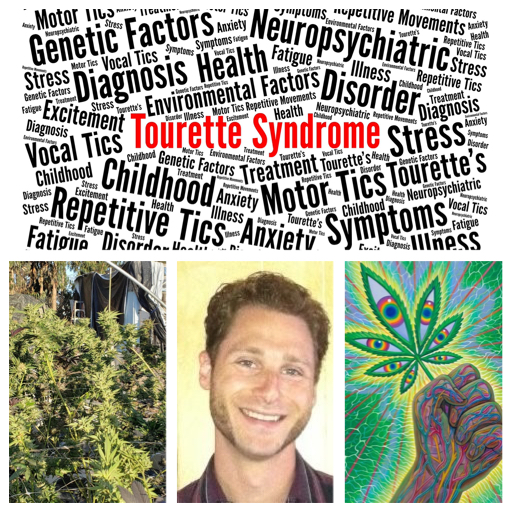For much of my adolescent and young adult life, I was plagued by what we called at the time “seizures,” which started as simple motor tics when I was about thirteen. It was a mild inconvenience at first – an accidental throwing of my pencil across the classroom as my arm twitched, or flinging food off my fork at the dinner table with an involuntary jerk – but over the next couple of years, the twitches became more severe, and effected as what looked very much like full-blown seizures, with muscle contractions that would lock up my legs and back, then creep up to encompass my whole body.
At that point, even my diaphragm would tighten up and steal my breath, and my oldest brother was even certain that at least once, my heart did the same thing, which he corrected with a swift thump to my chest. Once the convulsion passed, I was exhausted, short of breath and coughing, and would experience “aftershocks” for several minutes. There were even times that my eyes would seize up, leaving me effectively blind for a time. The key indicator that this was not epilepsy, however, was that at no point did I lose consciousness; I was awake and aware through every episode, grimacing through the pain of my full body contracting all of its muscles at once.

Naturally, all of this led to intense medical investigation, conducted initially at St. Louis Children’s Hospital. Unfortunately, despite being visited by every neurologist anywhere close enough to come gawk at me, and spending several days getting tested for conditions so rare that the doctors and lab techs had to look them up to know how to test for them, we left the hospital with baffled doctors assigning a descriptive diagnosis of non-epileptic multifocal myoclonus, a mouthful of medical jargon that means I was not epileptic, and had sudden contractions of muscle groups all over my body.
Despite their own diagnosis of non-epilepsy, they chose to prescribe me Depakote, a medication used for treating epilepsy and manic episodes. Not only did this not help, but it caused me severe difficulties with thinking, memory, and even had my days and nights reversed so I slept all day and was up all night. Several years of further pursuit for a solution led to a series of doctors and specialists throwing various drugs at me, including Klonopin and Valium, mostly with the intent that if they couldn’t stop the convulsions, at least I would be unconscious and unaware of them. But the drugs didn’t stop them, and I would simply wake up exhausted from convulsing in my sleep, and further mentally degraded from the effects of the drugs I had been placed on.
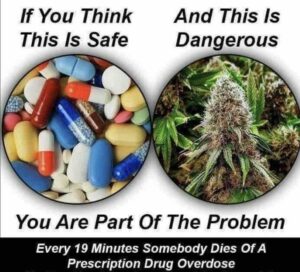
With the proposed solutions being more harmful to me than the problem they were trying to address. I learned to deal with the issue on my own. I was able to identify the times when I was feeling more “twitchy,” and even learned I could hold off some of the convulsions for a time, though much like building tension on a spring, eventually the energy I was holding back would have to come out. I learned to use meditation to allow the “seizures” to effect, and after a half hour or so writhing on the floor, I could rest a bit and then return to life as usual. The method worked for the most part, outside of times of high stress or fatigue, during which the twitches very much had the upper hand over me, and I was not able to hold them back.
I had decided that this was simply how I would have to live with whatever this condition was, and had given up on anything helping me when I found cannabis. Truthfully, it was the need for an alternative to antidepressants that led me to cannabis initially. The pharmaceutical solution I had been offered left me emotionless and uncaring, unable to eat or sleep, and in a general lackadaisical state. I mentioned the problems with the medication to my brother, who suggested that cannabis might be a better option. He was right. Cannabis was very effective at not only combatting the symptoms of depression, but the side effects were just the opposite of the anti-depressants – I was full of compassion, I had a healthy appetite, I was once again able to sleep, and I was excited by and interested in the world around me.
But that wasn’t all I noticed. My twitches, or “seizures,” or whatever they were, suddenly were much less severe. Many days I barely had a twitch at all, let alone a full episode to incapacitate me. Stress and fatigue still played a contributing role, but cannabis seemed to have both preventive and corrective effects for me. The problem was that cannabis was at the time illegal in my state, meaning I was forced to be a criminal for the sake of having access to the only thing that seemed to work for me. Clearly this is a problem in and of itself, but being forced to accept whatever I could find on the black market also meant that I had no control over (and very limited knowledge of) the particulars of the cannabis I was using. Still yet, this was better than the results with the pharmaceuticals, and I was forced to accept the legal and social side effects of using a banned medicine.
All of that changed in 2015, when Illinois launched a pilot program to allow the use of medical cannabis. There were numerous hoops to jump through, including getting fingerprinted and making multiple fairly expensive trips to the compassion clinic to discuss my condition with a doctor who was open to using cannabis medicine. It was at that clinic that I finally had some direction to gain understanding of what I had been experiencing for years.
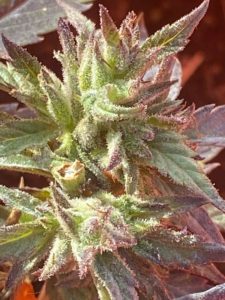
I described my “myoclonic tics” to the doctor, and he asked me a few questions – could I feel them coming on, could I stop them, and what happens if I do try to stop them. I explained yes, I could feel it coming, yes, I could push them off for a time, and if I did, they would eventually have to be allowed to express. That, he told me, is all very indicative of Tourette’s Syndrome. He further asked if I had any vocal tics (another symptom generally required for Tourette’s diagnosis), and I explained I make sounds inside my mouth by chomping rhythms with my teeth, but they aren’t audible to others. With this he was convinced, and after a couple of follow up visits he was able to recommend medical cannabis, and a few weeks later I received my card from the state.
In the meantime, I had done some homework. Even as a cannabis user for years, I knew that suspicion abounds when suddenly thousands of people start asking for access to a controlled substance, and I wanted to be sure this diagnosis was not just the result of a cannabis-friendly doctor working the system by assigning me a qualifying condition that somewhat matched my symptoms. What I found was astounding. Not only did my physical symptoms match with Tourette’s Syndrome, but mental symptoms I had dealt with for years – including OCD, ADD, anger issues, and anxiety – were indicated as highly comorbid with TS. What’s more, the extreme sensitivity to light and sound I have always found not only uncomfortable, but at times downright painful, were also likely related to my TS in the form of Sensory Processing Disorder. So now that I finally had an understanding of what was going on with my body, it was time to really try to understand how and why cannabis helped me, and determine exactly what forms and strains would help me the most.
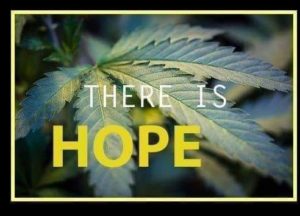
Access to a selection of products at a dispensary makes a world of difference to any cannabis user. The reality is that nearly everyone I know who is a daily (or at least regular) cannabis user recognizes that it brings them some benefit mentally or physically that they haven’t been able to receive from any other source. However, without legal and safe access to cannabis, most are forced like I was to buy whatever is available on the black market, meaning that in addition to having to worry whether their medicine is safe, they have to accept it even if it is not the right strain for them. For years, I also did this, since any cannabis worked better for me than no cannabis, but I only began to understand how to really treat my symptoms once I was able to access and experiment with different strains, and ultimately different forms of cannabis medicine.
What I found was that with the right blend of sativa, indica, and CBD strains, I was able to address all of my different symptoms. I was able to focus my racing thoughts, my anxiety was calmed, and my tics were drastically reduced. But what’s more, I even experienced relief from the severity of my sensory overload and my OCD tendencies. Bright lights are a little easier to tolerate, loud noises, while still uncomfortable, don’t always send me into a fit of tics, and little things like counting my steps or the number of times I pass a knife through a vegetable while I cut it are no longer compulsory, and I either don’t do them, or am able to stop myself in the act and decide not to obsess about it.
As time went on, I began to experiment with different forms of cannabis. Flower is important in my regimen to achieve an immediate effect (I vaporize rather than smoke), and helps immensely with calming tics and lessening anxiety. But using flower all day to keep a lasting effect is impractical from a social and logistical standpoint since it is both overt and time-consuming to medicate in this way, so I sought a better alternative to allow me to experience relief over the long term. I have found that concentrated cannabis oil, often called RSO (for Rick Simpson Oil, named for the Canadian activist who promoted its use), is an ideal alternative for me. It provides me a steady undercurrent that keeps my symptoms largely in check, and is a quick, discreet method of medicating.
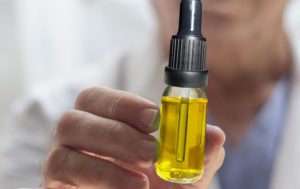
In addition to finding the proper forms, it has been essential for me to learn that a blend of CBD and THC is most effective to curtail my symptoms and keep a balanced effect. I find a nano emulsified CBD gives great bioavailability and a very quick onset, and I use this morning and night. The effect on my tics is remarkable. When I wake in the morning, my first few minutes are characterized by head twitches, arms and hands shaking and jerking, and a general feeling that my nerves are hooked to a car battery and current is being pushed through me. Within ten minutes of taking the nano CBD, the twitching has stopped, my hands are under my control, and my nerves feel like they have had a calming blanket wrapped around them to contain the energy shooting through them.
I add the RSO into the mix next, taking it orally and allowing it to absorb in my mouth as much as possible. I have found this gives me a fairly short onset time (around 30-45 minutes), and allows the effect to onset gently, with stronger effects settling in around the hour and a half to two hour mark. With this, I generally do not eat for at least an hour, preferably up to two hours after I have taken the RSO. If I do eat within that time frame, the onset effect is generally stronger and a little faster. If I actually take the RSO with food, it has effectively turned the combination of food and medicine into an infused edible, and onset is much more pronounced with a heavier body effect than I experience taking the RSO without food. (Speaking of food, RSO has also been instrumental in allowing me to manage my IBS symptoms, and has actually changed my digestion, allowing me to digest foods that I hadn’t been able to for years. While I am not completely symptom free, the ability to even occasionally eat things I had avoided for years is extremely freeing. But all of that is a different story for a different time.)
Ultimately, cannabis medicine has drastically improved my quality of life with Tourette’s. My symptoms are manageable, and the most common response I hear when I discuss my TS with someone for the first time is, “I had no idea you have Tourette’s,” to which I reply that this is a testament to the power of cannabis to allow the body to regulate itself and stabilize its systems. No other medicine that I have encountered has ever come close to offering the benefits I receive from cannabis, let alone with such minimal side effects.
While I am extremely grateful that I have access to the medicine I need, I am also acutely aware that there are millions of people who are struggling with debilitating symptoms and unable to receive the relief they deserve. What’s worse, the mainstream medical community has maligned cannabis for so long that many people, even in states with medical cannabis, still have great difficulty in receiving the recommendation for cannabis from a “qualified” doctor as many medical management companies strictly prohibit their affiliates from even discussing medical cannabis. It is true, access is improving, and continued research furthered by entities like the Global Cannabinoid Research Center will help to advance the cause, but we still have a long way to go to allow people the full benefit and improved quality of life that all people deserve.

–Kaleb Pape, Cannabis Content Writer – Mike’s Medicines
Thank you for visiting and reading Kaleb’s intense article. Patient journeys like his allow for the world to learn more about the never ending benefits of plant medicine – specifically cannabis of all types. Everyday people are finding freedom from a life of suffering from this issue or that and dealing with a healthcare system that basically throws pills at problems instead of a way to fix them. Cannabis is truly the answer for so many – we’re thankful that Kaleb shared his journey with Tourette’s as it’s important for the public at large to see how important Cannabis is as a medicine.
Mike Robinson, Medicinal Cannabis Patient. Founder Global Cannabinoid Research Center. But most of all – Genevieve’s Daddy.

